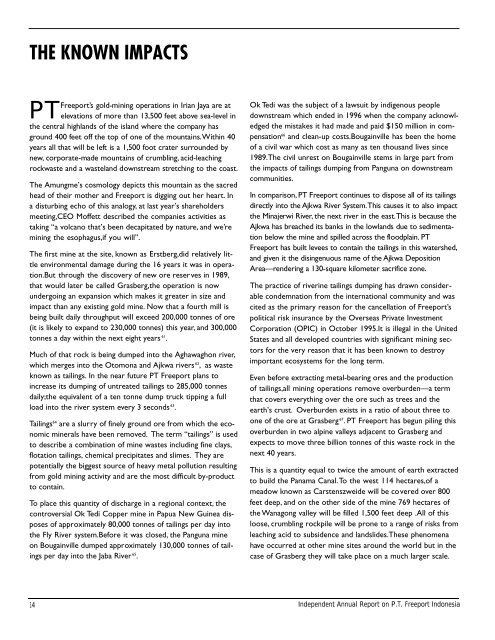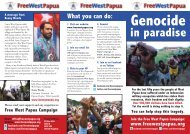Risky Business: The Grasberg Gold Mine An ... - Free West Papua
Risky Business: The Grasberg Gold Mine An ... - Free West Papua
Risky Business: The Grasberg Gold Mine An ... - Free West Papua
You also want an ePaper? Increase the reach of your titles
YUMPU automatically turns print PDFs into web optimized ePapers that Google loves.
THE KNOWN IMPACTS<br />
F re e p o rt ’s gold-mining operations in Irian Jaya are at<br />
P Te l evations of more than 13,500 feet above sea-level in<br />
the central highlands of the island where the company has<br />
g round 400 feet off the top of one of the mountains.Within 40<br />
years all that will be left is a 1,500 foot crater surrounded by<br />
n ew, corporate-made mountains of crumbling, a c i d - l e a c h i n g<br />
rockwaste and a wasteland dow n s t ream stretching to the coast.<br />
<strong>The</strong> Amungme’s cosmology depicts this mountain as the sacred<br />
head of their mother and <strong>Free</strong>port is digging out her heart. In<br />
a disturbing echo of this analogy, at last year’s shareholders<br />
meeting,CEO Moffett described the companies activities as<br />
taking “a volcano that’s been decapitated by nature, and we’re<br />
mining the esophagus,if you will”.<br />
<strong>The</strong> first mine at the site, known as Erstberg,did relatively little<br />
environmental damage during the 16 years it was in operation.But<br />
through the discovery of new ore reserves in 1989,<br />
that would later be called <strong>Grasberg</strong>,the operation is now<br />
undergoing an expansion which makes it greater in size and<br />
impact than any existing gold mine. Now that a fourth mill is<br />
being built daily throughput will exceed 200,000 tonnes of ore<br />
(it is likely to expand to 230,000 tonnes) this year, and 300,000<br />
tonnes a day within the next eight years 61 .<br />
Much of that rock is being dumped into the Aghawaghon river,<br />
which merges into the Otomona and Ajkwa rivers 62 , as waste<br />
known as tailings. In the near future PT <strong>Free</strong>port plans to<br />
increase its dumping of untreated tailings to 285,000 tonnes<br />
daily;the equivalent of a ten tonne dump truck tipping a full<br />
load into the river system every 3 seconds 63 .<br />
Tailings 64 are a slurry of finely ground ore from which the economic<br />
minerals have been removed. <strong>The</strong> term “tailings” is used<br />
to describe a combination of mine wastes including fine clays,<br />
flotation tailings, chemical precipitates and slimes. <strong>The</strong>y are<br />
potentially the biggest source of heavy metal pollution resulting<br />
from gold mining activity and are the most difficult by-product<br />
to contain.<br />
To place this quantity of discharge in a regional context, the<br />
controversial Ok Tedi Copper mine in <strong>Papua</strong> New Guinea disposes<br />
of approximately 80,000 tonnes of tailings per day into<br />
the Fly River system.Before it was closed, the Panguna mine<br />
on Bougainville dumped approximately 130,000 tonnes of tailings<br />
per day into the Jaba River 65 .<br />
14<br />
Ok Tedi was the subject of a lawsuit by indigenous people<br />
downstream which ended in 1996 when the company acknowledged<br />
the mistakes it had made and paid $150 million in compensation<br />
66 and clean-up costs.Bougainville has been the home<br />
of a civil war which cost as many as ten thousand lives since<br />
1989.<strong>The</strong> civil unrest on Bougainville stems in large part from<br />
the impacts of tailings dumping from Panguna on downstream<br />
communities.<br />
In comparison, PT Fre e p o rt continues to dispose all of its tailings<br />
d i re c t ly into the Ajkwa River System.This causes it to also impact<br />
the Minajerwi Rive r, the next river in the east.This is because the<br />
Ajkwa has breached its banks in the lowlands due to sedimentation<br />
below the mine and spilled across the floodplain. P T<br />
F re e p o rt has built levees to contain the tailings in this watershed,<br />
and given it the disingenuous name of the Ajkwa Deposition<br />
A re a — rendering a 130-square kilometer sacrifice zone.<br />
<strong>The</strong> practice of riverine tailings dumping has drawn considerable<br />
condemnation from the international community and was<br />
cited as the primary reason for the cancellation of <strong>Free</strong>port’s<br />
political risk insurance by the Overseas Private Investment<br />
Corporation (OPIC) in October 1995.It is illegal in the United<br />
States and all developed countries with significant mining sectors<br />
for the very reason that it has been known to destroy<br />
important ecosystems for the long term.<br />
Even before extracting metal-bearing ores and the production<br />
of tailings,all mining operations remove overburden—a term<br />
that covers everything over the ore such as trees and the<br />
earth’s crust. Overburden exists in a ratio of about three to<br />
one of the ore at <strong>Grasberg</strong> 67 . PT <strong>Free</strong>port has begun piling this<br />
overburden in two alpine valleys adjacent to <strong>Grasberg</strong> and<br />
expects to move three billion tonnes of this waste rock in the<br />
next 40 years.<br />
This is a quantity equal to twice the amount of earth extracted<br />
to build the Panama Canal.To the west 114 hectares,of a<br />
meadow known as Carstenszweide will be covered over 800<br />
feet deep, and on the other side of the mine 769 hectares of<br />
the Wanagong valley will be filled 1,500 feet deep .All of this<br />
loose, crumbling rockpile will be prone to a range of risks from<br />
leaching acid to subsidence and landslides.<strong>The</strong>se phenomena<br />
have occurred at other mine sites around the world but in the<br />
case of <strong>Grasberg</strong> they will take place on a much larger scale.<br />
Independent <strong>An</strong>nual Report on P.T. <strong>Free</strong>port Indonesia



